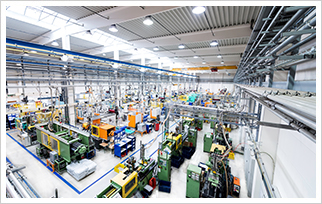Injection Molding Offers a Wide Range of Production and Environmental Benefits
 Perhaps surprising to today’s consumers, there was a period when industrial manufacturing companies produced the majority of their products, parts, containers, etc. from glass, steel, or metals such as tin and copper. These types of materials certainly served their purposes, but often tended to make finished items heavier in weight, susceptible to breakage/damage, or non-reusable.
Perhaps surprising to today’s consumers, there was a period when industrial manufacturing companies produced the majority of their products, parts, containers, etc. from glass, steel, or metals such as tin and copper. These types of materials certainly served their purposes, but often tended to make finished items heavier in weight, susceptible to breakage/damage, or non-reusable.
Over the past several decades though, while there are still some products that are made of glass, steel, or metals, consumers have become accustomed to purchasing and using many goods that are predominantly or wholly manufactured using some form of plastic material or a rubber or elasticized substance; these items are often lighter in weight yet quite durable, and many can also be recycled or reclaimed instead of clogging up landfill or waste disposal sites. And, perhaps of primary importance to consumers, the majority of these newer-age products are frequently less expensive than their predecessors as well.
Much of this transition, so to speak, can be associated with an increased use of the injection molding process within industrial manufacturing. Injection molding, in its basic definition, is a method for producing parts or products by injecting a substance into a pre-designed mold. This type of production can be employed with a assortment of substances, such as metal, glass, and rubber, although a variety of plastics are the most commonly used materials; in this respect, manufacturers may explicitly refer to this process as plastic injection molding.
There are numerous advantages to the application of an injection molding process, such as:
- Lower labour costs
- Minimal scrap or waste
- Mass production capabilities
- Faster cycle/production times
- Parts shapes can be almost limitless
- Repeatability (non-operator-dependent)
- High tolerances – minimal need for finishing
- Flexibility – one mold, different product colours/textures
An additional and rather topical or contemporary advantage of the injection molding process relates to its overall environmental impact. Due to recent technological advancements, this manufacturing methodology uses 20-50% less energy than just a decade ago; furthermore, lighter-weight plastics are replacing heavier metals/steel in the production of motor vehicles and aircraft, thereby resulting in reduced fuel consumption and improved energy efficiency.
One further example where cost-efficiencies and energy-efficiencies can be achieved by this process pertains specifically to a methodology called two-shot injection molding. Applying this variation gives manufacturers the capability to more produce complex parts/items using two different materials during the same production run or cycle; this requires the rotation of two molds during that cycle then adding a secondary material to the original piece/part via the second mold in order to fabricate products that are high-quality, ergonomically shaped, and/or aesthetically appealing.
Injection Molds and Other Mold-Making Services to Support Your Production Needs
As noted above, injection molding requires the use of a pre-designed mold or, in the case of two-shot injection molding, two pre-designed molds. Hence, from a manufacturer’s point of view, their ability to fully capitalize on the operational and financial benefits associated with their injection molding processes/services will rely heavily on the precision of those molds.
Noble Precision has the capabilities to create the precision molds their clients need to meet their respective production specifications; skilled designers from Noble Precision can develop such molds to accommodate the following materials used in the injection molding process:
- Plastics
- Molten metals
- Thermoplastics
- Rubber/other polymers
This expertise is supported by Noble Precision’s substantial financial investment in state-of-the-art technology, most notably in 5-axis simultaneous CNC machines as well as the latest in CAD/CAM software, hence offering their clients access to the most advanced and precise machining capabilities and services.
Furthermore, Noble Precision’s proficiencies in mold-making are not limited to the injection molding process only; their services in this area include the design and creation of precision molds used in other types of manufacturing processes such as:
All of the high-precision molds manufactured by Noble Precision will help deliver the utmost production efficiencies for their clients including time and cost savings, waste reduction, and high tolerances. Further information on the mold-making capabilities of Noble Precision is available by visiting our Mold Making Services page.
For accurate molds to support the production of high-quality and high-tolerance parts/goods through injection molding or other types of manufacturing processes, Call the mold-making specialists at Noble Precision at 647-499-7569 or Contact us to request a no-obligation consultation.

